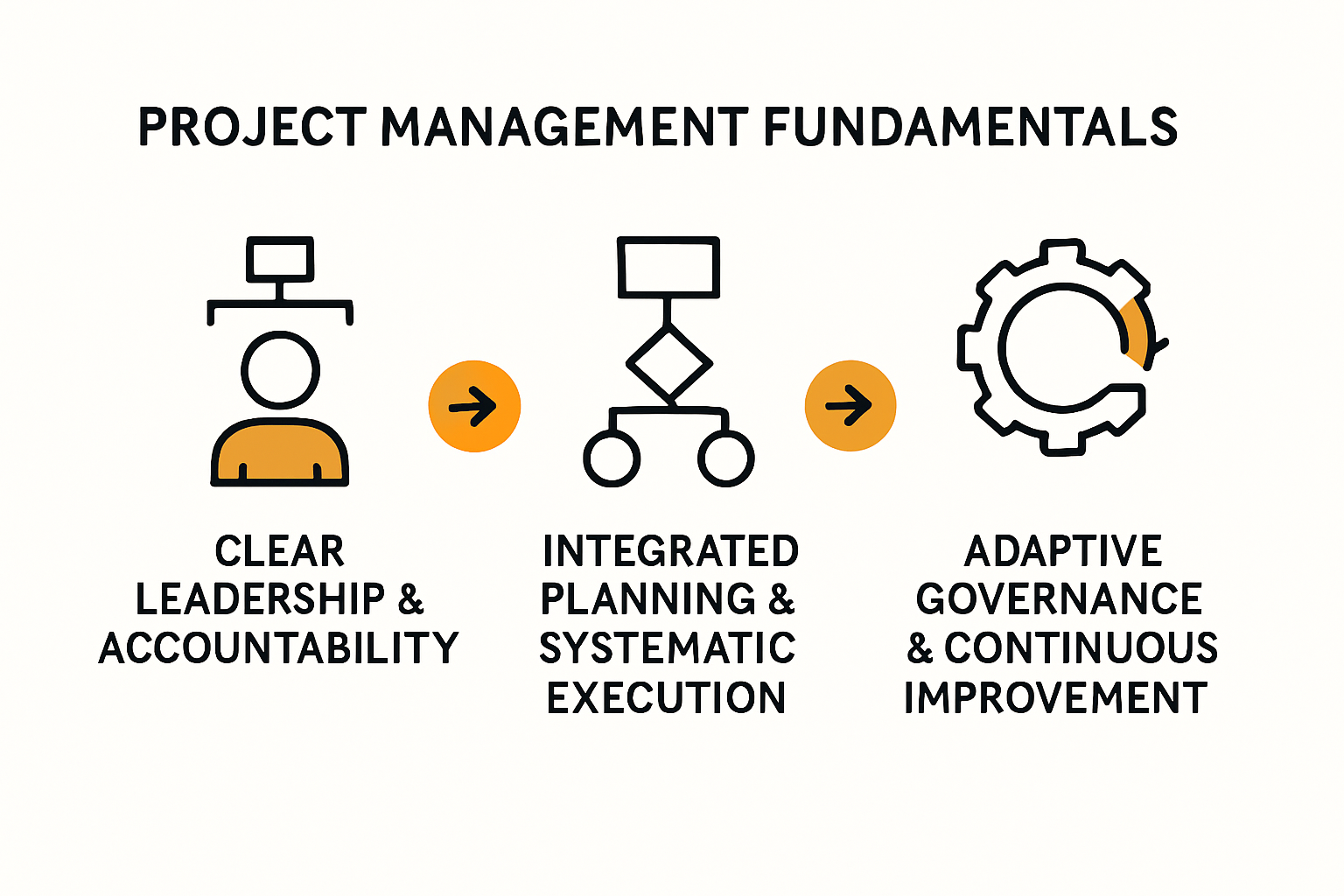Project management is changing fast and the skills you mastered last year might not be enough for what lies ahead. Nearly 88 percent of high-performing organizations already use project management principles beyond just traditional fields. Most think success means rigid schedules and meetings at every turn, but the truth is that flexibility and adaptive leadership will define which teams actually succeed in 2025.
Table of Contents
- Core Principles Of Project Management Fundamentals
- Building Strong Teams And Effective Leadership
- Essential Tools And Techniques For Modern Projects
- Adapting Project Management Fundamentals Across Roles
Quick Summary
| Takeaway | Explanation |
|---|---|
| Establish Clear Leadership | Effective project management hinges on having a single responsible leader who provides strategic vision, decision-making, and communication. This empowers teams and aligns efforts towards project goals. |
| Implement Integrated Planning | Successful projects require thorough planning that defines scope, optimizes resources, and assesses risks, reducing uncertainties and disruptions throughout the execution phase. |
| Foster Team Dynamics and Communication | Building strong project teams involves developing trust, defining roles, and encouraging collaboration, which are essential for fostering high-performance environments. |
| Utilize Modern Tools and Methodologies | Embracing digital platforms and flexible project methodologies like Agile and PERT enables project managers to navigate complex challenges and improve outcomes effectively. |
| Adapt Principles Across Roles | Project management fundamentals can be tailored across various professional contexts, enhancing strategic thinking, collaborative problem-solving, and adaptability. |
Core Principles of Project Management Fundamentals
Project management fundamentals are the critical foundation that transforms complex initiatives from abstract concepts into successful realities. Understanding these core principles enables professionals to navigate organizational challenges, align team efforts, and deliver consistent results across diverse project environments.

Establishing Clear Leadership and Accountability
At the heart of effective project management lies a crucial principle of clear leadership. According to the Project Management Institute, having a single responsible leader who drives the project’s vision and execution is paramount. This project manager serves as the central point of authority, making critical decisions, managing team dynamics, and ensuring strategic alignment.
Successful project leadership goes beyond mere title or position. It requires a comprehensive approach that includes:
- Strategic Vision: Crafting a clear roadmap for project objectives
- Communication Mastery: Facilitating transparent and effective team interactions
- Decision Making: Providing decisive guidance during complex scenarios
The project manager must balance technical expertise with interpersonal skills, creating an environment where team members feel empowered and motivated to contribute their best work.
Integrated Planning and Systematic Execution
The Project Management Body of Knowledge (PMBOK) emphasizes the critical importance of integrated planning before project execution. This principle suggests that successful projects require comprehensive preparation that encompasses scope, timeline, resource allocation, and potential risk mitigation strategies.
Integrated planning involves several key components:
- Comprehensive Scope Definition: Clearly outlining project boundaries and deliverables
- Resource Optimization: Strategically allocating human and material resources
- Risk Assessment: Identifying potential challenges and developing proactive mitigation strategies
By adopting a systematic approach, project managers can reduce uncertainties, minimize unexpected disruptions, and create a more predictable path to project completion. This methodical framework allows teams to anticipate challenges and develop robust contingency plans.
Adaptive Governance and Continuous Improvement
Modern project management recognizes that rigidity can be a significant barrier to success. The principles outlined by the Department of Transport and Main Roads highlight the importance of creating flexible governance structures that can adapt to changing organizational needs.
Adaptive governance involves:
- Performance Monitoring: Regular assessment of project progress and outcomes
- Feedback Integration: Incorporating team and stakeholder insights
- Iterative Learning: Continuously refining processes based on real world experiences
This principle acknowledges that project management is not a static discipline but a dynamic practice that requires constant evolution. By embracing flexibility and maintaining a growth mindset, project managers can transform challenges into opportunities for innovation and organizational learning.
These core principles of project management fundamentals provide a robust framework for professionals seeking to elevate their strategic capabilities. By understanding and implementing these guidelines, teams can significantly enhance their probability of delivering successful, impactful projects that meet or exceed organizational expectations.
Building Strong Teams and Effective Leadership
Building strong teams and developing effective leadership are critical components of successful project management. These elements transform individual contributors into high-performing units capable of achieving complex organizational objectives.
Foundations of Team Dynamics and Communication
According to research from the RAND Corporation, modern project teams require more than technical skills to succeed. Soft skills like communication, emotional intelligence, and inclusive leadership have become paramount in creating cohesive and adaptable work environments.
Effective team building involves several strategic approaches:
- Trust Development: Creating psychological safety where team members feel comfortable sharing ideas
- Clear Role Definition: Establishing transparent expectations and responsibilities
- Collaborative Culture: Encouraging open dialogue and mutual respect
Team leaders must recognize that each member brings unique perspectives and strengths. By understanding individual motivations and potential, managers can design strategies that leverage diverse talents and create synergistic work relationships.
Leadership Strategies for High Performance
Research published in the Journal of Construction Engineering and Management highlights evidence-based leadership practices that drive team performance. These practices extend beyond traditional management techniques and focus on empowerment, strategic goal setting, and continuous feedback.
Key leadership strategies include:
- Empowerment: Delegating meaningful responsibilities
- Goal Alignment: Connecting individual tasks to broader organizational objectives
- Continuous Learning: Creating environments that support skill development and knowledge sharing
Successful leaders understand that their role is not to micromanage but to create conditions where team members can excel. This approach requires a delicate balance of guidance, trust, and professional autonomy.
Cultivating Resilient and Adaptive Teams

In an era of rapid technological and organizational change, teams must be more than just functional. They need to be resilient, adaptable, and capable of navigating complex challenges with minimal friction.
Cultivating such teams requires deliberate strategies:
- Conflict Resolution: Developing constructive approaches to managing disagreements
- Skill Diversity: Recruiting team members with complementary capabilities
- Adaptive Mindset: Encouraging flexibility and continuous learning
Leaders who invest in team development create environments where innovation thrives. By fostering a culture of mutual respect, continuous improvement, and shared accountability, organizations can build teams that consistently deliver exceptional results.
Building strong teams and effective leadership is not a one-time event but an ongoing process of nurturing talent, facilitating growth, and creating supportive work environments. Successful project managers understand that their most significant resource is not technology or processes but the human potential of their team members.
Essential Tools and Techniques for Modern Projects
Modern project management requires a sophisticated arsenal of tools and techniques that enable professionals to navigate complex organizational challenges with precision and efficiency. Understanding and leveraging these resources can significantly enhance project outcomes and team productivity.
Digital Project Management Platforms
According to the University of San Diego, contemporary project managers have access to powerful digital platforms that streamline collaboration and task management. Tools like Trello, Asana, and Jira have revolutionized how teams track progress, assign responsibilities, and maintain transparent communication.
Key features of these digital platforms include:
- Real-time Collaboration: Enabling instant communication across distributed teams
- Task Tracking: Providing visual representations of project progress
- Resource Allocation: Helping managers optimize team workloads
These platforms go beyond simple task management, offering integrated solutions that support complex project ecosystems and facilitate seamless information sharing.
To help you compare different project management methodologies discussed in this section, refer to the table below.
| Methodology | Approach Type | Key Features | Best For |
|---|---|---|---|
| Waterfall | Linear/Sequential | Clear, unchanging requirements; step-by-step phases | Projects with defined outcomes and stability |
| Scrum | Iterative | Rapid adaptation; continuous improvement; sprints | Projects needing high adaptability |
| Kanban | Visual/Flow-based | Workflow visualization; focus on flow optimization | Ongoing tasks, workflow optimization |
| PERT | Estimation/Planning | Probabilistic forecasting; timeline estimation | Uncertain projects; complex scheduling |
| Agile (General) | Iterative/Adaptive | Flexibility; stakeholder involvement; incremental work | Dynamic, fast-changing environments |
Strategic Planning and Estimation Techniques
Forbes Advisor highlights the Program Evaluation and Review Technique (PERT) as a critical methodology for estimating project timelines, particularly in environments with significant uncertainty. PERT allows project managers to develop more accurate predictions by considering multiple potential scenarios and their probabilities.
Strategic planning techniques encompass:
- Timeline Estimation: Creating realistic project schedules
- Risk Assessment: Identifying potential challenges and developing mitigation strategies
- Probabilistic Forecasting: Understanding potential variations in project outcomes
Professional project managers recognize that effective planning involves more than rigid scheduling. It requires a nuanced approach that anticipates potential variations and builds flexibility into project frameworks.
Agile and Adaptive Project Methodologies
The Istituto Europeo di Design provides insights into various project management methodologies, emphasizing the importance of selecting approaches that match specific project requirements. Different methodologies like Waterfall, Scrum, and Kanban offer unique frameworks for managing projects across diverse industries.
Key methodological approaches include:
- Waterfall Method: Linear, sequential approach ideal for projects with clear, unchanging requirements
- Scrum: Iterative framework supporting rapid adaptation and continuous improvement
- Kanban: Visual management technique focusing on workflow optimization
Successful project managers understand that no single methodology fits all scenarios. The ability to select, customize, and blend different approaches based on project specifics is a hallmark of advanced professional practice.
Essential tools and techniques represent the strategic infrastructure of modern project management. By embracing digital platforms, employing sophisticated planning techniques, and adopting flexible methodological approaches, professionals can transform complex challenges into structured, achievable objectives. The future of project management lies not just in understanding these tools, but in creatively applying them to drive organizational success.
Adapting Project Management Fundamentals Across Roles
Project management fundamentals are not confined to a single industry or role. These versatile principles can be strategically applied across diverse professional environments, transforming how individuals approach complex challenges and organizational objectives.
Project Management in Professional Contexts
A comprehensive study in the Journal of Information Systems Education highlights the critical importance of developing project management competencies that transcend traditional boundaries. Modern professionals require adaptable skills that enable them to navigate complex organizational landscapes with precision and strategic insight.
Cross-role project management competencies include:
- Strategic Thinking: Developing holistic perspectives beyond immediate tasks
- Collaborative Problem Solving: Creating integrated solutions across departmental boundaries
- Adaptive Communication: Tailoring communication styles to different stakeholder needs
Professionals who master these skills become invaluable assets, capable of bridging gaps between different organizational functions and driving collaborative success.
Below is a summary table highlighting how project management fundamentals are adapted across different environments and roles as discussed above.
| Application Area | Key Adaptation Strategies | Core Competencies Gained |
|---|---|---|
| Professional Contexts | Strategic thinking, cross-team collaboration | Problem solving, adaptability |
| Educational/Institutional | Contextual flexibility, interdisciplinarity | Integration, skill transferability |
| Personal Development | Continuous learning, self-reflection | Growth mindset, cross-functional skills |
Educational and Institutional Applications
Research from the Public Medical Communications demonstrates how project management strategies can be effectively implemented across educational and institutional environments. The ability to translate project management principles into varied contexts requires nuanced understanding and flexible implementation.
Key adaptive strategies involve:
- Contextual Flexibility: Modifying project management approaches to suit specific organizational cultures
- Interdisciplinary Integration: Connecting project management principles across different professional domains
- Skill Transferability: Developing core competencies that remain relevant across multiple roles
Successful professionals recognize that project management is not a rigid set of rules but a dynamic framework that can be customized to meet unique organizational challenges.
Personal and Professional Development Pathways
Adapting project management fundamentals requires continuous learning and self-reflection. Professionals must view these principles as dynamic tools that evolve with technological advancements and changing workplace dynamics.
Strategies for personal development include:
- Continuous Learning: Regularly updating skills and knowledge
- Cross-functional Exposure: Seeking experiences in diverse professional environments
- Reflective Practice: Analyzing personal performance and identifying improvement opportunities
By approaching project management as a growth-oriented discipline, individuals can transform these fundamental principles into powerful personal development strategies. The most successful professionals are those who can seamlessly adapt their project management skills to different roles, industries, and organizational contexts.
Project management fundamentals are more than a professional toolkit. They represent a comprehensive approach to problem solving, strategic thinking, and organizational effectiveness. As workplace environments continue to evolve, the ability to flexibly apply these principles becomes increasingly critical for individual and collective success.
Frequently Asked Questions
What are the core principles of project management fundamentals?
Core principles of project management fundamentals include establishing clear leadership and accountability, integrated planning and systematic execution, and adaptive governance and continuous improvement. These principles help ensure successful project outcomes.
How can I build strong teams and effective leadership in project management?
Building strong teams involves fostering team dynamics through trust development, clear role definition, and a collaborative culture. Effective leadership strategies include empowerment, goal alignment, and continuous learning to enhance team performance.
What modern tools and methodologies should I consider for project management in 2025?
Essential tools for modern project management include digital platforms like Asana and Jira, along with methodologies such as Agile, Scrum, and Kanban. These tools enable effective collaboration, task management, and adaptive project execution.
How can I adapt project management skills across different roles and industries?
Project management skills can be adapted by applying strategic thinking, collaborative problem-solving, and adaptive communication across various contexts such as professional environments, educational settings, and personal development pathways.
Ready to Transform Your Project Management in 2025?
Are you feeling the weight of constant meetings, scattered tasks, and overwhelming administrative work highlighted in the article above? While mastering project management fundamentals matters, the real challenge is putting those principles into action—integrated planning, dynamic team leadership, and adaptive tools can only succeed if your systems support them. Many teams struggle to free up time, empower leaders, and foster agile, high-performing workflows because their day-to-day tools are fragmented or outdated. Your drive for streamlined execution and team success deserves better.

Gammatica.com offers a modern solution built precisely for your evolving needs. With AI-driven automation, clear task management, and integrated Kanban boards, Gammatica.com combines what you learned about effective team collaboration, adaptive planning, and continuous improvement—all in one intuitive platform. Start saving up to 16 hours weekly, reduce chaos, and give your projects the clarity they deserve. Discover the smarter way to lead your projects and teams to success—try Gammatica.com today and see immediate impact.



